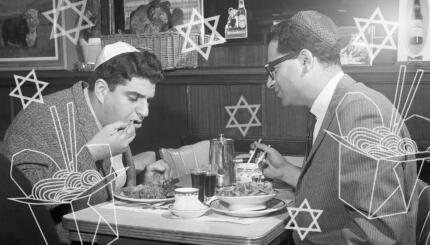Yesterday, Efrat Libfroind wrote about being a mother and being a full-time pastry chef. Her new cookbook, Kosher Elegance
.
I’ll never forget the first time I entered the lecture hall at the most famous cooking school in the world. Even though I was already the mother of 3 children, I felt like a little girl on my first day of school.
Around me I heard a babble of languages from all over the world – something that was very new to me. I was convinced everyone was looking at me, the ultra-Orthodox Jewish woman with a wig on her head.
In the first lecture (“Intro to Food Technology”) I was unable to concentrate for the first half hour – I was way too self-conscious. I finally relaxed a bit and was able to lose myself in what turned out to be a very fascinating topic.
As the course progressed, I realized that I was not very different than my fellow students except for my headgear. Regardless, somehow, most of the students realized I was Jewish. If they didn’t, they figured it out soon enough.
As you might imagine, a big part of professional cooking courses is tasting foods. Besides the pleasure of eating gorgeous cakes and other creations there is also the important aspect of being able to taste various ingredients, to feel the textures and understand firsthand what was discussed in the lectures. So the first time when everyone stood around the chef and started tasting foods and
schmoozing about the dishes I just wanted to disappear into a corner so I couldn’t be seen. I was the “kosher student”. Now I was forced to deal with it.
Soon after, a kind-hearted American woman, about 60, came running over to me with a plate of something wonderful and could not understand why I wasn’t trying it out. I explained that as an observant Jew, I wouldn’t eat food that wasn’t kosher and cooked in kosher utensils. She didn’t really get it, and then a few other students leaned in to take part in the conversation (some have since become well-known chefs!).
They tried to make sense of what I was saying. “You won’t taste anything here? Never? So what are you doing here?” I did my best to explain what observing the laws of kashrut meant and how that played out in my life (and in cooking school!).
Since then, a lot of cooking and baking has happened for all of us. My first trial by fire wasn’t so easy but once I got used to the various responses I received….I was fine. Plus, I was pretty popular since I always gave away my food to others!
Over the years as I have participated in numerous professional courses I have developed a much better sense of smell which helps me during tests or other times when tasting food is important.
So while I have missed out on many food tastings (and calories) over the years…..I have learned a ton.
Efrat Libfroind is the author of Kosher Elegance. She will be posting all week for the Jewish Book Council and MyJewishLearning’s Jewish Authors Blog.
kashrut
Pronounced: kahsh-ROOT, Origin: Hebrew, the Jewish dietary laws.
kosher
Pronounced: KOH-sher, Origin: Hebrew, adhering to kashrut, the traditional Jewish dietary laws.


